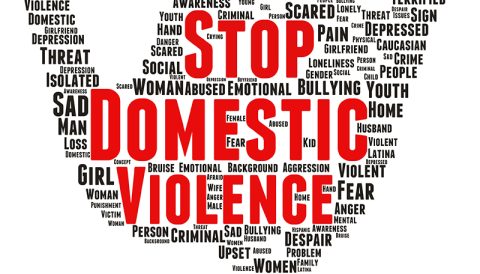FEATURES: Domestic Violence: A Growing Epidemic
Articles/Opinion, Featured, Latest Headlines Thursday, January 23rd, 2025
(AFRICAN EXAMINER) – Beatrice was woken up by a loud sound on Sunday afternoon. Before she could raise her head, she heard much more. Someone was knocking hard on her apartment’s main entrance door.
She went toward the door to ask who was knocking.
It was her neighbour, Lade, who got married three years ago.
“Help me, Aunty Beatrice. Please open the door, I have stabbed Desmond,” Lade whispered.
Beatrice could feel the tension in Lade’s voice as she opened the door.
Lade’s body had blood stains, and out of curiosity, Beatrice rushed to Lade’s kitchen and met her husband in a pool of blood.
“Desmond and I had an argument, he slapped me twice and I slapped back.
“He flogged me with his belt many times and gave me fist blows. I couldn’t bear them, and I ran to the kitchen, picked a knife and stabbed him on the stomach. I dont know what got over me,” Lade said, sobbing.
Desmond eventually landed in an intensive care unit of a hospital but was saved.
Desmond’s case is one of the many dreaded cases of domestic violence, and many victims are not as lucky as Desmond to be alive to tell the story.
Analysts are worried that domestic violence is on the increase and has ruined thousands of marriages and turning products of such marriages (children) to street urchins.
A relationship counsellor, Mr Obi Achugo, observes that domestic violence is now a monster in Nigeria, urging that it must be eliminated fast.
According to the Lagos State Domestic and Sexual Violence Agency (DSVA), it received 6, 456, cases of Sexual and Gender Based Violence (SGBV) on adult and children from September 2023 to July 2024, with 73 per cent of the cases being that of domestic violence on adult.
An expert in mental health management, Mrs Abosede Ewumi, describes domestic violence as an epidemic which affects individuals regardless of age, economic status, sexual orientation, gender, race, religion or nationality as well as location.
Ewumi, a Professor of Counseling, Mental Health and Psychology at Tai Solarin University of Education, Ogun, warns that domestic violence is often accompanied by emotionally-abusive and controlling behaviour.
According to her, a survey in 2019 by the National Bureau of Statistics revealed that 30 per cent of Nigerian women, aged between 15 years and 49 years, has experienced physical violence, while 68 per cent have encountered emotional, economic or sexual abuse.
“Despite efforts by government and non-governmental organisations with so many programmes to ameliorate this epidemic called domestic violence, it is very unfortunate that it is still on the rise.
“Domestic violence, also referred to as domestic abuse or intimate partner violence, can be defined as a pattern of behaviour in any relationship that is used to gain or maintain power and control over an intimate partner.
“It is a wilful intimidation, physical assault, battery, sexual assault and other abusive behaviour as part of systematic power and control perpetrated by one intimate partner against the other.
“It includes any behaviour that frightens, intimidates, terrorises, manipulates, hurts, humiliate, blames or injures someone,” the don explains.
She adds that domestic violence can be physical, sexual, physiological, emotional or economic.
According to her, these five forms of domestic violence can happen to anyone, either in an intimate partner relationship or in the general society.
The expert is worried that domestic violence is often perpetrated by a complex interplay of factors, including traditional beliefs, psychological disorders, family traits and socio-economic conditions.
She is convinced that Nigeria’s traditional beliefs and cultural norms often perpetrates gender-based violence, as women are frequently expected to assume subservient roles, making them vulnerable to abuse.
Ewumi urges a shift in cultural attitudes that promote gender inequality and harmful traditional practices.
The don identifies psychological disorders, such as depression and anxiety, as contributors to aggressive behaviour.
She regrets that many Nigerians lack access to mental health services, adding that this exacerbates the problem.
“Increasing awareness and access to mental health resources, counselling and therapy are crucial in addressing this issue.
“Family traits and learned behaviour can also cause domestic violence, as children who witness abuse are more likely to become perpetrators or victims.
“Breaking this cycle requires intentional parenting, education and community engagement.
“Unemployment, poverty and economic hardship can create a toxic environment, fueling domestic violence.
“To mitigate this, there is need for economic empowerment programmes, job creation initiatives and social safety nets to support vulnerable populations,” Ewumi submits.
She recommends strengthening of laws and policies fostering community involvement, supporting victims and holding perpetrators accountable.
According to her, by addressing the root causes of domestic violence and implementing practical solutions, Nigeria can work toward creating a safer and more equitable society for all.
A Development Psychologist at the Federal University Oye-Ekiti, Dr Toyin Adaramoye, is of the opinion that the most talked about form of domestic violence in Nigeria and Africa is physical abuse.
Adaramoye, however, observes that emotional abuse, which is less talked about, is also dangerous because it brings about low self esteem.
“There are lots of marriages where husbands tell their wives not to relate with any friends or members of their families, thereby isolating them and bringing down their self esteem.
“Economic abuse occurs when a man prevents his wife from working or having access to what will make her have financial freedom.
“There is also technological abuse in which one partner uses technology to monitor, stalk, track location and read emails of the other partner without the partner’s consent,” she notes.
The lecturer believes that domestic violence is not gender-specific, saying that there are women who abuse men.
According to her, domestic violence is often under-reported, making obtaining an accurate figure difficult.
Adaramoye calls for creation of anger management centres in communities to help individuals struggling to control their emotions.
She warns that mental and emotional effects of domestic violence can led to Post-Traumatic Stress Disorder (PTSD).
“There are also physical effects of domestic violence which include injuries, damage of internal organs, and it can lead to death.
“We must use the media to challenge some of our social norms that promote gender inequality and unhealthy relationships.
“Community leaders, religious institutions and traditional rulers can help in shifting cultural norms that perpetrate inequality,” she urges.
Mrs Marian Jones, a one-time Chairperson, International Federation of Women Lawyers, Ikeja Branch, emphasises that the society must refrain from some religious norms promoting gender inequality in order to tackle domestic violence.
Jones says the patriarchal nature of African society and gender stereotypes have positioned men as socially superior, allowing them to exert power over women.
According to her, traditional beliefs impose economic barriers on women, restricting resource control and allocation primarily to men.
“In some Nigerian communities, women are even denied family inheritances,” she observes.
A Lagos-based lawyer, Mr Abdul Wahab, is convinced that tackling domestic violence in Nigeria will require a multi-faceted approach championed not only by government but by all and sundry.
Wahab strongly believes that there is the need to create more awareness about the menace, adding that many cases of domestic violence are unreported.
“This might be due to intimidation, societal norms, stigma and the socio-economic situation.
“In effect, the media has a major role to play by shedding light on such violence, sharing survivors’ experiences and promoting zero tolerance for domestic violence.
“Traditional and religious leaders also have roles to play by promoting values and attitudes that can reduce or prevent violence against women and the girl-child,” he urges.
Analysts urge collective efforts to eliminate domestic violence and save lives, homes and the society.
By Adenike Ayodele, News Agency of Nigeria (NAN)
Related Posts
Short URL: https://www.africanexaminer.com/?p=100390






















